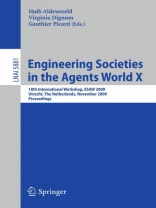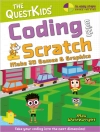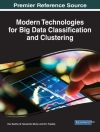The 10th international workshop “Engineering Societies in the Agents’ World” (ESAW 2009), was held in Utrecht, The Netherlands, during November 18–20, 2009. In the tradition of its predecessors, ESAW 2009 was committed to the idea of multi-agent systems (MAS) as highly interconnected societies of agents, paying particular attention to the social aspects, methodologies and software infrastructures that tackle the emergent complexities of MAS. The idea for the ESAW workshop series was born 10 years ago, in 1999, among the members of the working group on “Communication, Coordination and Collaboration” of Agent Link, the 1st European Network of Excellence on Agent-Based Computing, out of a critical discussion about the general mi- set of the agents community. Central to this discussion is the need for proper consideration of systematic aspects of MAS, acknowledging the importance of a multi-disciplinary approach, that takes into account the social, environmental and technological perspectives. These issues that are as actual today as they were in 1999, which is con?rmed by the steady interest in the ESAW workshop series that previous editions took place in: – Berlin, Germany, 2000 (LNAI 1972) – Prague, Czech Republic, 2001 (LNAI 2203) – Madrid, Spain, 2002 (LNAI 2577) – London, UK, 2003 (LNAI 3071) – Toulouse, France, 2004 (LNAI 3451) – Kusadasi, Turkey, 2005 (LNAI 3963) – Dublin, Ireland, 2006 (LNAI 4457) – Athens, Greece, 2007 (LNAI 4995) – Saint-Etienne, France, 2008 (LNAI 5485) This10thworkshopwasdevotedtothediscussionoftechnologies, methodologies and models for the engineering of complex applications based on MAS, and broughttogetherresearchersandcontributionsfrombothwithinandoutsidethe agents’?eld–fromsoftwareengineering, distributedsystems, socialsciences, and
Mục lục
1: Invited Talks.- The Immergence of Norms in Agent Worlds.- Thinking Integral: How to Build Complex Systems That Live with People and Exhibit Collective Intelligence.- 2: Self-organisation.- A Space-Based Generic Pattern for Self-Initiative Load Balancing Agents.- A Goal-Oriented Approach for Modelling Self-organising MAS.- Engineering Agent Organisations in a Business Environment.- Peer-to-Peer Overlay Network Based on Swarm Intelligence.- 3: Software-Engineering and Architectures.- Agent Architectures for Compliance.- Incorporating BDI Agents into Human-Agent Decision Making Research.- Programming Organization-Aware Agents.- Energy Trade-Offs in Resource-Constrained Multi-Agent Systems.- 4: Social Aspects of Agent Societies.- Engineering Social Reality with Inheritance Relations.- Determining the Trustworthiness of New Electronic Contracts.- Trust Based Evaluation of Wikipedia’s Contributors.- Evolutionary Role Model for Multi-Agent Systems.- 5: Organisation and Autonomy.- Replication Based on Role Concept for Multi-Agent Systems.- Knowledge Management in Role Based Agents.- Balancing Organizational Regulation and Agent Autonomy: An MDE-Based Approach.- Cooperative Sign Language Tutoring: A Multiagent Approach.- Assistance Layer in a P2P Scenario.- Navigational Web-Interfaces from Formal Tropos Specification.- 6: Demonstrations.- ALIVE: A Framework for Flexible and Adaptive Service Coordination.- An Organisational Adaptation Simulator for P2P Networks.- Pre Sage-MS: Metric Spaces in Pre Sage.- Normative Multi-Agent Organizations.- Hybrid Teams in Virtual Environments: Samurai Joins the Training Team.- Joint Activity Testbed: Blocks World for Teams (BW4T).












